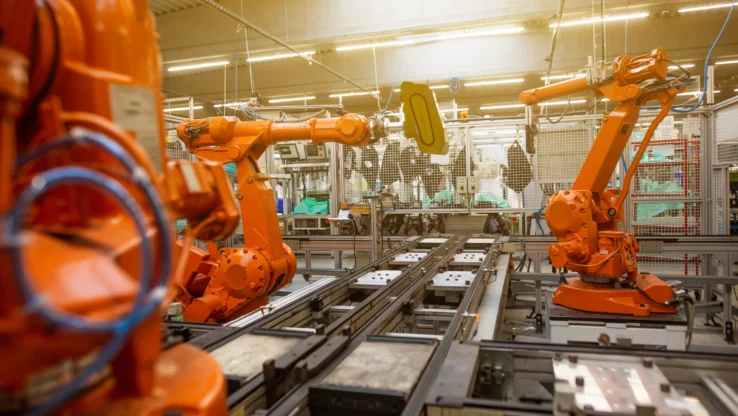AI and Automation: The Future of Semiconductor Manufacturing (Part Two)
22. August 2023
More agile, more efficient, more autonomous: Artificial intelligence (AI) and automation solutions are already radically changing the semiconductor industry. In the second part of our series, we look at the exciting prospects of digital megatrends.
AI unlocks enormous potential for semiconductor companies across the whole value chain, from research and chip design to production and sales. That was the conclusion of the first article in our two-part series. The innovation efforts come at the right time, as the industry faces escalating prices.
The Semiconductor Industry Is Flourishing, but Costs Are Increasing
According to Vantage Market Research, the global semiconductor market will grow from USD 429.5 billion in 2021 to a staggering USD 712.4 billion in 2028. At the same time, the annual chip design costs are rising. According to EE Times Europe, designing a 5-nm chip in 2020 cost around USD 540 million, while 65-nm processors cost much less than USD 50 million in 2016.
AI and automation software have the potential to make manufacturing more efficient and cost-effective. According to a study by McKinsey, the implementation of AI and machine learning (ML) might generate up to USD 40 billion in additional yearly pre-tax income for the semiconductor industry. Over the following four years, this number may more than double, reaching USD 95 billion. However, there is still a long way to go: according to McKinsey, only about 30% of semiconductor manufacturers are actually generating value through AI and ML. The remaining 70% are still in the pilot stage. A key reason is that many managers are unsure in which use cases AI solutions contribute the most value. Simply put, there aren’t enough empirically verified figures to build a strategy and roadmap on. Furthermore, there is often a lack of suitable IT infrastructure and high-quality data to train AI and ML systems. This data is typically collected by sensors at the factory, which requires additional investments in hardware and data processing capabilities.
Four AI Application Areas in the Semiconductor Industry
- Scheduling AI can help in the scheduling of industrial operations to boost efficiency and reduce costs.
- Inspection AI can help with quality control by using data to identify deviations.
- Optimization AI can optimize operations by recognizing and analyzing data patterns and identifying inefficiencies.
- Decision-making From logistics to manufacturing to services, AI can help in decision-making through data analysis.
AI Use Cases in the Semiconductor Industry
Consider the lithography station at a typical semiconductor manufacturing facility. Circuit patterns are projected onto silicon wafers there. Machine sensors provide constant data on operational conditions such as temperature, pressure, and speed. AI and ML can recognize repeating patterns in this data, as well as anomalies. This enables the prediction of when a machine is likely to fail. Operators can precisely plan maintenance tasks and avoid unplanned downtime. Analyzing sensor data, for example, can help to optimize the pressure and temperature for the procurement of circuit patterns. This allows for higher production and decreased downtime.
Consider the etching process: the etching depth is a critical parameter for chip functionality, and it is affected by the processing time. Conventional methods for predicting the optimum processing time are based on linear models. They are unable to completely represent the complex nonlinear interactions found in real-world systems. Machine learning, on the other hand, can capture even highly complex structures and hence identify the optimal processing time.
AI can also uncover flaws and errors that people miss. This is made possible by “computer vision” – a type of AI that extracts relevant information from digital images or videos. Defects on wafers are one example: a convolutional neural network (CNN) can be trained to analyze wafer photos and detect even the smallest deviations that might indicate a defect. This can raise quality control to a new level while also lowering downtime expenses.
AI Is the Future of the Semiconductor Industry
AI/ML and automation solutions will become increasingly important in the semiconductor industry in the next years. An exciting period of transformation has begun. The difficulties are undeniably considerable. However, the change creates enormous opportunities for growth, innovation, and optimization. Companies’ capacity to leverage artificial intelligence could influence their continued success in data-centric semiconductor production.


